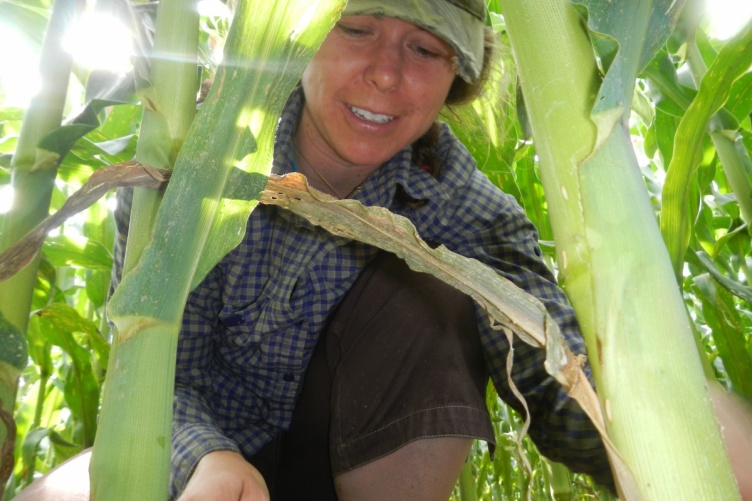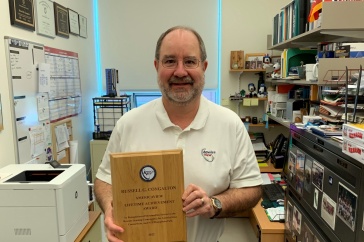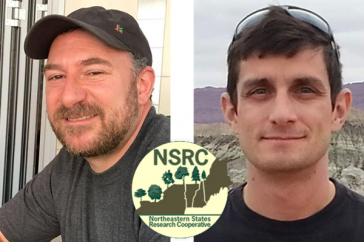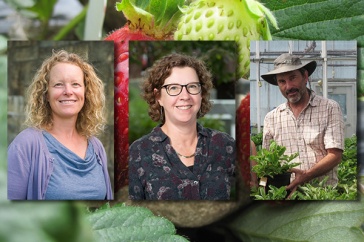
Lesley Atwood collects soil fauna samples in a maize field. (Credit: Dave Mortensen)
Lesley Atwood, a doctoral candidate in agroecology at the University of New Hampshire, will discuss the opportunities and unintended consequences of managing agricultural soil food webs at NOFA-NH Winter Conference, Saturday, Jan. 28, 2017.
Atwood studies the interface between agriculture, soil ecology, and community ecology. “Soil food webs contribute to desirable agroecosystem services, including nutrient cycling and pest suppression. However, their composition and ability to function can be negatively impacted by the intense disturbances that are characteristic of many cropping systems. Currently, many of our cropping systems rely on frequent and intense disturbances – such as tillage and pesticides – and low crop plant diversity to maximize crop yields. Each of these practices comes with tradeoffs,” she said.
For example, Atwood explained that tilling soil disrupts pest cycles by physically damaging or burying pests. However, it also disturbs pest natural enemies, such as predatory beetles, that live in the soil and contribute considerable value to the agroecosystem by consuming pests that attack crops.
“As it is widely recognized that we need to reduce agriculture’s environmental footprint while still meeting the food demands of our growing population, farmers are faced with the challenge of maximizing the agronomic benefits of a practice while also minimizing its negative environmental impacts,” she said. Atwood hopes that her research can help farmers reach their yield goals by providing practical information about managing the soil food web to foster desirable agroecosystem services.
At this year’s NOFA-NH Winter Conference, Atwood will discuss who lives in the soil and their agroecological function, as well as general principles for encouraging functionally diverse soil food webs in our agroecosystems. She also will present detailed results from two of her experiments, which were conducted in collaboration with Richard Smith, associate professor of agroecology at UNH and a researcher with the NH Agricultural Experiment Station; David Mortensen, professor of weed and applied plant ecology at Penn State; and Roger Koide, professor of biology at Brigham Young University.
This material is based upon work supported by the NH Agricultural Experiment Station, through joint funding of the National Institute of Food and Agriculture, U.S. Department of Agriculture, under award number 1006827, and the state of New Hampshire. It also was supported by external research funding from the USDA and Annie’s Sustainable Agriculture.
The NOFA-NH Winter Conference will be held at Rundlett Middle School in Concord. For more information, visit http://www.nofanh.org/winterconference.
Founded in 1887, the NH Agricultural Experiment Station at the UNH College of Life Sciences and Agriculture is UNH’s original research center and an elemental component of New Hampshire's land-grant university heritage and mission. We steward federal and state funding, including support from the USDA National Institute of Food and Agriculture, to provide unbiased and objective research concerning diverse aspects of sustainable agriculture and foods, aquaculture, forest management, and related wildlife, natural resources and rural community topics. We maintain the Woodman and Kingman agronomy and horticultural research farms, the Macfarlane Research Greenhouses, the Fairchild Dairy Teaching and Research Center, and the Organic Dairy Research Farm. Additional properties also provide forage, forests and woodlands in direct support to research, teaching, and outreach.
-
Written By:
Lori Tyler Gula, PhD | NH Agricultural Experiment Station | lori.gula@unh.edu | 603-862-1452


















































